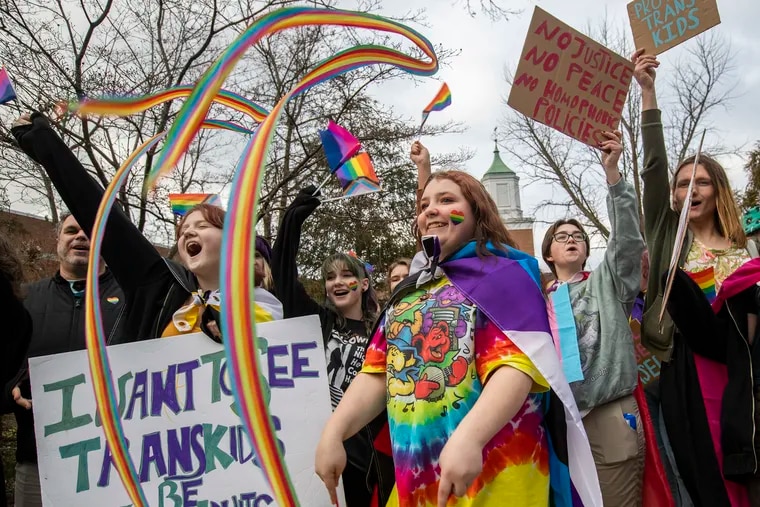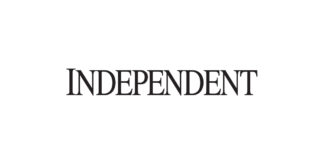/cloudfront-us-east-1.images.arcpublishing.com/pmn/54CWU7QBO5DUZOZZQZ5COAHE3A.jpg)
To carry out its new policy prohibiting “sexualized content” in school libraries, the Central Bucks School District turned to a Harrisburg group that bills itself as defending religious freedom and has opposed rights for transgender students.
The district, which is facing a federal investigation into allegations it has created a hostile environment for LGBTQ students, declined to answer questions about its relationship with the Independence Law Center, which it says it enlisted to review its regulations accompanying the library policy. The center and the Pennsylvania Family Institute, the nonprofit affiliated with it, didn’t respond to requests for comment.
Central Bucks acknowledged that it is already reviewing whether books violate the new rules, though it said no formal challenges have been filed. Among the books being considered for removal: This Book is Gay; Me, Earl and the Dying Girl; Gender Queer; Lawn Boy; and Beyond Magenta.
“The district has a responsibility to guard against the sexualization of children and will protect kids from age-inappropriate, graphic, sexualized content,” Superintendent Abram Lucabaugh said in a statement. “To have not taken a look at some of the titles that were raised over more than a year ago, to pretend that we don’t know that graphic, illustrated, highly descriptive sexualized content is in some books, would be akin to looking the other way.”
He said that a “committee of professionals” — the district’s library coordinator, school librarians, administrators, teachers and the K-12 language arts supervisor — would determine “whether a book is age-appropriate for the school library or not.”
The library regulations that the law center reviewed, however, give the superintendent final authority on removing books, according to the American Civil Liberties Union of Pennsylvania, which filed the complaint that triggered the investigation into the district’s treatment of LGBTQ students.
“They create these things that sound like some thorough, well-reasoned policy or regulation. All it does is still give the superintendent unilateral authority to make decisions,” said Rich Ting, staff attorney with the ACLU-PA.
The regulations state that the superintendent “shall determine whether challenged resources remain in the collection and whether any restrictions will be placed on access to the resources during the review process,” and that if the complainant isn’t satisfied by discussion with a librarian or “removal of the material by the district library coordinator or superintendent,” the complainant can submit a reconsideration request to the library coordinator.
Four of the five books currently being reviewed feature LGBTQ characters, a theme of much of the book-banning activity that has surged in school districts nationally in recent years. The books were listed in an email a district employee sent to librarians on Dec. 1 that was first reported on by WHYY and also viewed by The Inquirer; the district confirmed that the books are under review but said they hadn’t been challenged.
While the district said the regulations demonstrate that its ban on sexualized content wasn’t taking aim at LGBTQ-related books or content, Ting said the involvement of the Independence Law Center suggested otherwise.
“It does confirm their intentions behind the library policy and regulations, given the Independence Law Center’s past history,” Ting said.
The district didn’t respond to specific questions about the regulations, why the school board had enlisted the law center — which it said had provided a pro bono review — or whether the center was involved in other district matters. The district disclosed the law center’s involvement last week in a message on its website, along with the regulations.
The law center has previously been involved with school districts, including on issues related to LGBTQ students. The group represented students who sued the Boyertown Area School District in Montgomery and Berks Counties over a policy allowing transgender students to use bathrooms corresponding with their gender identity. The center lost the case, which the U.S. Supreme Court declined to hear on appeal.
In 2021, it helped craft a policy for the Hempfield School District in Lancaster County barring transgender students from playing on sports teams in line with their gender identity.
It also has intervened in hot-button national cases outside the state, including filing an amicus brief in support of the Colorado man who refused to bake a wedding cake for a gay couple.
The Pennsylvania Family Institute — the nonprofit of which the law center is a part — lists among its policy goals “standards for explicit sexual content in schools” and “curriculum transparency.” (Both fall under the category of “family,” which the institute says “starts with a healthy marriage between one man and one woman, who raise their children in an intentional and loving home. Not only does this align with God’s design for sexuality and family, but studies have proven time and again that they are key to a flourishing culture and society.”)
The institute is the Pennsylvania state affiliate of the national Family Research Council, an organization that advocates a “biblical worldview” and has been labeled a hate group by the Southern Poverty Law Center for advocating anti-LGBTQ positions.
Central Bucks, which has hired the Duane Morris law firm and former U.S. Attorney Bill McSwain to address allegations it has created a hostile environment for LGBTQ students, has argued that it isn’t targeting those students with its policies — saying a new ban on staff advocacy for “partisan, political, or social policy issues” in classrooms will bar Pride flags, but also displays such as antiabortion posters.
On its website, the Pennsylvania Family Institute advises that schools with written policies prohibiting explicit sexual content are “less susceptible to baseless allegations that the title was removed for an impermissible viewpoint discriminatory reason.”
“Such policies treat inappropriate sexually explicit content the same regardless of whether the sexually explicit depictions or descriptions happen to be between straight, gay, or even a lone person,” the group says. “As such the argument made by those who desire to see sexually explicit materials in the hands of minors, that these policies are directed at LGBT people, is false.”








